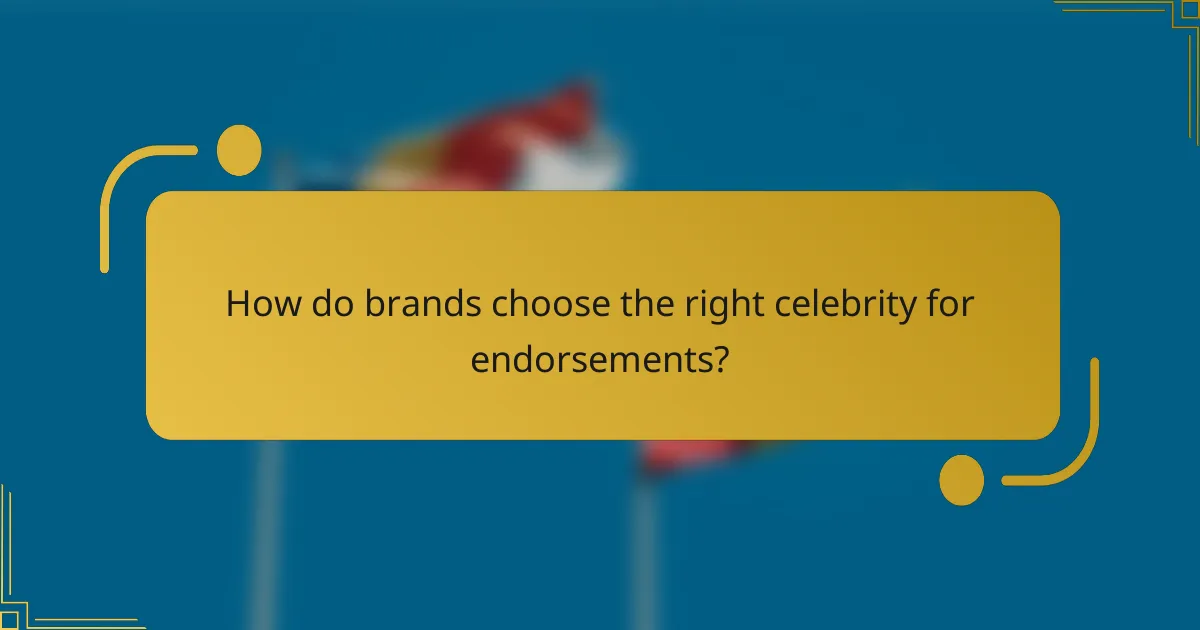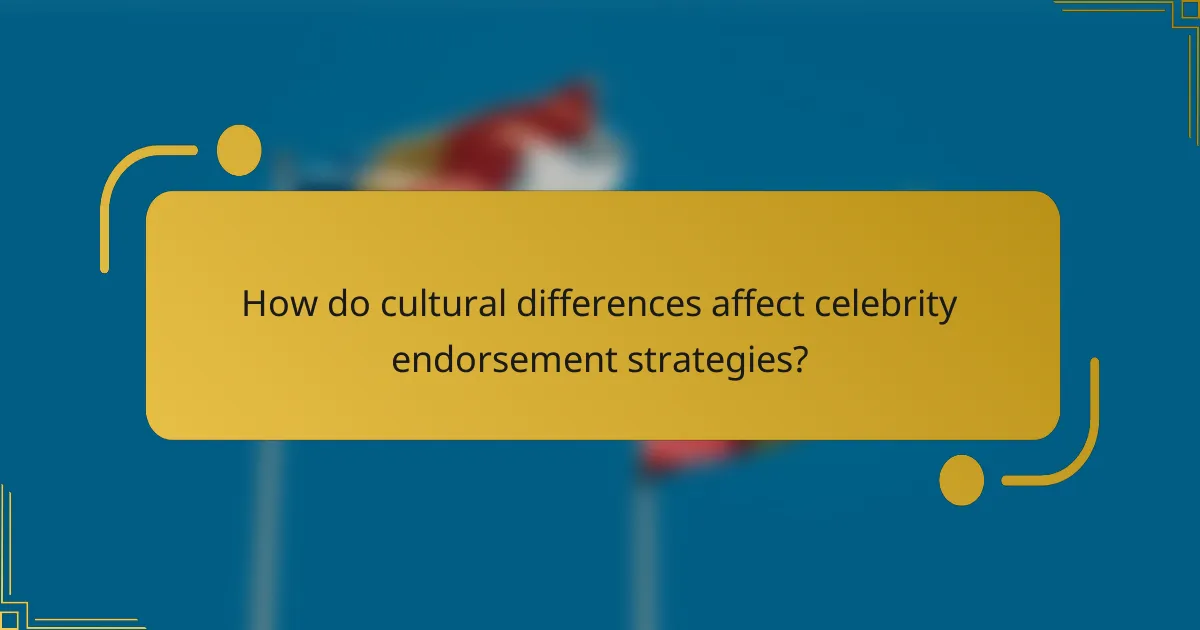Celebrity endorsements play a crucial role in shaping consumer behavior by tapping into the trust and admiration that fans have for well-known figures. By aligning a brand with a celebrity who embodies its values, companies can enhance their visibility and credibility, ultimately leading to increased sales and customer loyalty.

How do celebrity endorsements influence consumer behavior?
Celebrity endorsements significantly influence consumer behavior by leveraging the popularity and credibility of well-known figures to enhance brand appeal. When consumers see a celebrity they admire promoting a product, it can lead to increased trust, better recall, and a stronger emotional connection with the brand.
Increased brand trust
Celebrity endorsements can boost brand trust by associating products with familiar and respected figures. When a celebrity endorses a brand, consumers often perceive it as a validation of quality and reliability, which can lead to higher purchase intentions.
For example, a well-known athlete endorsing a sports drink may lead consumers to believe that the product is effective and beneficial for performance. This trust can translate into increased sales and customer loyalty.
Enhanced brand recall
Celebrity endorsements enhance brand recall by creating memorable associations between the celebrity and the product. Consumers are more likely to remember a brand when it is linked to a popular figure, making it stand out in a crowded marketplace.
Using catchy slogans or memorable visuals featuring the celebrity can further reinforce this recall. For instance, a celebrity’s unique catchphrase can become synonymous with the brand, making it easier for consumers to remember and recognize it later.
Emotional connection with consumers
Celebrity endorsements foster an emotional connection with consumers by tapping into the aspirational qualities of the celebrity. Fans often feel a personal connection to their favorite stars, which can be transferred to the brands they endorse.
For example, a beloved actor promoting a charitable cause can evoke feelings of goodwill and empathy, encouraging consumers to support the brand. This emotional bond can lead to increased engagement and a stronger brand affinity over time.

What are the most effective celebrity endorsements in the US?
The most effective celebrity endorsements in the US leverage the star’s influence to enhance brand visibility and credibility. Successful endorsements often result in increased sales and brand loyalty, particularly when the celebrity aligns well with the brand’s values and target audience.
Michael Jordan for Nike
Michael Jordan’s endorsement of Nike revolutionized sports marketing and created the iconic Air Jordan brand. His unmatched athletic performance and cultural impact made him a perfect fit for Nike, leading to billions in revenue and a lasting legacy in sneaker culture.
When considering celebrity endorsements, brands should evaluate the celebrity’s authenticity and connection to the product. Jordan’s genuine passion for basketball and his personal story resonated deeply with consumers, making the partnership highly effective.
Oprah Winfrey for Weight Watchers
Oprah Winfrey’s partnership with Weight Watchers significantly boosted the brand’s visibility and credibility. Her personal journey with weight loss and her genuine endorsement helped to humanize the brand, making it relatable to a broad audience.
Brands should focus on the emotional connection a celebrity can create with their audience. Winfrey’s authenticity and ability to inspire trust played a crucial role in driving membership and engagement for Weight Watchers.
Kylie Jenner for beauty brands
Kylie Jenner’s influence in the beauty industry has been profound, particularly with her own brand, Kylie Cosmetics. Her social media presence and ability to connect with younger audiences have made her endorsements highly effective, leading to rapid sales growth and brand loyalty.
When engaging a celebrity like Jenner, brands should consider their social media reach and engagement levels. Jenner’s savvy use of platforms like Instagram allows her to create buzz and drive sales quickly, making her a valuable asset for beauty brands targeting millennials and Gen Z.

How do brands choose the right celebrity for endorsements?
Brands select the right celebrity for endorsements by evaluating factors such as alignment with brand values, appeal to the target audience, and social media presence. These criteria ensure that the celebrity resonates with the brand’s identity and effectively reaches potential customers.
Alignment with brand values
Choosing a celebrity whose values align with the brand is crucial for authenticity. For instance, a sustainable clothing brand might opt for an eco-conscious celebrity known for environmental advocacy. This alignment fosters trust and strengthens the brand’s message.
Brands should assess the celebrity’s past actions and public persona to ensure consistency with their own values. Misalignment can lead to backlash and damage to the brand’s reputation.
Target audience appeal
Understanding the target audience is essential when selecting a celebrity. Brands should consider demographics such as age, gender, and interests to find a celebrity who resonates with their consumer base. For example, a brand targeting millennials may choose a popular influencer known for relatable content.
Conducting market research can help identify which celebrities have the strongest appeal among the desired audience. This can include surveys, focus groups, or analyzing social media engagement metrics.
Social media presence
A celebrity’s social media presence can significantly impact the effectiveness of endorsements. Brands should evaluate the celebrity’s follower count, engagement rates, and overall influence on platforms like Instagram, TikTok, and Twitter. A strong presence can amplify the brand’s message and reach a wider audience.
Additionally, brands should consider how the celebrity interacts with their followers. Authentic and engaging content can enhance the endorsement’s impact, while a lack of interaction may diminish effectiveness. Brands should aim for celebrities who actively engage with their audience to maximize reach and influence.

What metrics measure the effectiveness of celebrity endorsements?
To evaluate the effectiveness of celebrity endorsements, key metrics include sales growth, social media engagement, and brand awareness surveys. These metrics provide insights into how well a celebrity’s influence translates into consumer behavior and brand perception.
Sales growth
Sales growth is a primary indicator of the effectiveness of celebrity endorsements. When a celebrity endorses a product, brands often see an increase in sales, typically ranging from low single-digit percentages to high double-digit increases, depending on the celebrity’s popularity and relevance to the product.
To measure this, compare sales figures before and after the endorsement campaign. Tracking sales over a few months can reveal trends and help determine if the endorsement had a lasting impact.
Social media engagement
Social media engagement measures how audiences interact with content related to the celebrity endorsement. Metrics such as likes, shares, comments, and follower growth are crucial indicators of effectiveness. High engagement rates often correlate with increased brand visibility and consumer interest.
Brands should monitor engagement metrics across various platforms, such as Instagram, Twitter, and TikTok. A significant spike in engagement following an endorsement can signal a successful campaign, with engagement rates often exceeding industry averages by tens of percent.
Brand awareness surveys
Brand awareness surveys assess how well consumers recognize and recall a brand after a celebrity endorsement. These surveys can be conducted before and after the campaign to measure changes in consumer perception and familiarity with the brand.
Effective surveys should include questions about brand recall, recognition, and overall perception. A notable increase in positive responses can indicate that the endorsement successfully raised brand awareness, often leading to improved market positioning and consumer trust.

What are the risks of celebrity endorsements?
Celebrity endorsements can pose several risks, including potential negative publicity, misalignment between the celebrity’s behavior and brand values, and high costs associated with partnerships. Brands must carefully evaluate these factors to mitigate potential damage to their reputation and financial investment.
Negative publicity impact
Negative publicity surrounding a celebrity can quickly affect the brands they endorse. A scandal or controversial statement can lead to public backlash, resulting in decreased consumer trust and sales. For example, if a celebrity faces legal issues or public outrage, brands may need to distance themselves to protect their image.
To minimize this risk, companies should monitor the public perception of their endorsers and have a crisis management plan in place. Regularly assessing the celebrity’s behavior and public statements can help brands anticipate potential issues before they escalate.
Celebrity behavior misalignment
When a celebrity’s actions or values do not align with a brand’s identity, it can create a disconnect that alienates consumers. For instance, if a health-focused brand partners with a celebrity known for unhealthy lifestyle choices, it may confuse or frustrate the target audience. This misalignment can lead to negative associations and reduced brand loyalty.
Brands should conduct thorough research on a celebrity’s public persona and past behavior before entering into an endorsement agreement. Ensuring that the celebrity’s image aligns with the brand’s values is crucial for maintaining credibility and consumer trust.
High costs of partnerships
Engaging a celebrity for endorsements often involves significant financial investment, which may not always yield proportional returns. Costs can range from thousands to millions of dollars, depending on the celebrity’s fame and marketability. Brands must weigh these costs against their marketing budgets and expected outcomes.
To optimize spending, companies should consider negotiating performance-based contracts that tie compensation to specific metrics, such as sales increases or social media engagement. This approach can help mitigate financial risks while still leveraging the celebrity’s influence effectively.

How do cultural differences affect celebrity endorsement strategies?
Cultural differences significantly shape celebrity endorsement strategies by influencing how consumers perceive celebrities and their connection to brands. Marketers must consider regional values, beliefs, and social norms to ensure endorsements resonate with local audiences.
Regional celebrity popularity
Celebrity popularity varies widely across regions, impacting the effectiveness of endorsements. For instance, a celebrity who is a household name in the United States may be relatively unknown in Europe or Asia. Brands should research local celebrity status to select endorsers who have strong recognition and appeal in specific markets.
Using local celebrities can enhance relatability and trust. For example, a popular local athlete in Brazil may connect better with consumers than an international star, leading to higher engagement and sales. Marketers should prioritize celebrities who align with regional sentiments and cultural relevance.
Local consumer preferences
Consumer preferences are deeply influenced by cultural factors, which can dictate the types of products endorsed and the messaging used. In some cultures, consumers may prefer endorsements that emphasize community and family, while others may respond better to individual success stories. Understanding these nuances is crucial for effective campaigns.
Brands should tailor their messaging to reflect local values and preferences. For example, in markets where sustainability is a priority, partnering with eco-conscious celebrities can enhance brand image and consumer trust. Conducting market research to identify these preferences can lead to more successful endorsement strategies.



